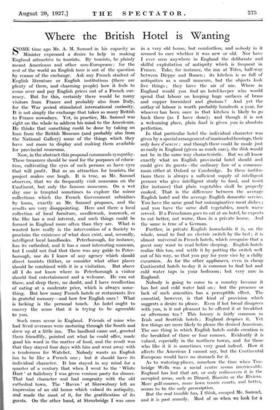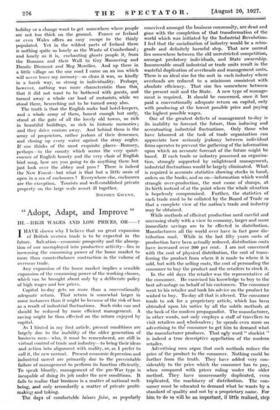Where the British Hotel is Wanting
SOME time ago Mr. A. M. Samuel in his capacity as Minister expressed a desire to help in making England attractive to tourists. By tourists, he plainly meant Americans and other non-Europeans : for the rest of the world an English tour is out of the question by reason of the exchange. Ask any French student of English literature or English institutions (there are plenty of them, and charming people) how it feels to come over and pay English priceS out of a French cur- rency. But for this, certainly there would be many visitors from France and probably also from Italy, for the War period stimulated international curiosity. It is not simply the exchange that takes so many British to France nowadays. Yet, in practice, Mr. Samuel was right on the whole to address his mind to the Americans. He thinks that something could be done by taking on loan from the British Museum (and probably also from the National Gallery) some of the things which they have not room to display and making them available for provincial museums.
Now, in the abstract this proposal commands sympathy. These treasures should be used for the purposes of educa- tion, cultivating the eyes of such persons as have eyes that will profit. But as an attraction for tourists, the Project makes one laugh. It is true, as Mr. Samuel observes, that we do frequently visit museums on the Continent, but only the famous museums. On a wet day one is tempted sometimes to explore the minor collections which the French Government subsidizes by loans, exactly as Mr. Samuel proposes, and the results are very disappointing. Here and there a local collection of local furniture, needlework, ironwork, or the like has a real interest, and such things could be formed in England more often than they are. What is wanted here really is the intervention of a Society to proclaim the existence of what does exist, and, secondly, intelligent local handbooks. Peterborough, for instance, has its cathedral, and it has a most interesting museum, but I could not find that there was any guide to Peter- borough, nor do I know of any agency which should direct tourists thither, or consider what other places should be combined with it in a visitation. But above all I do not know where in Peterborough a visitor should find entertainment and a welcome. He can eat there, and sleep there, no doubt, and I have recollection of eating at a moderate price, which is always some- thing. But how many French hotels or restaurants live in grateful memory—and how few English ones ! What is lacking is the personal touch. An hotel ought to convey the sense that it is trying to be agreeable to you.
Such cases occur in England. Friends of mine who bad lived overseas were motoring through the South and drew up at a little inn. The landlord came out, greeted them friendlily, pointed out what he could offer, made good his word in the matter of food, and the result was that they stayed four days with him and went away with a tenderness for Watchet. Nobody wants an English inn to be like a French one ; but it should have its individual character. It has stayed in my mind for a quarter of a *century that when I went to the ' White Hart' at Salisbury I was given venison pasty for dinner. That had character and had congruity with the old cathedral town. The ' Raven ' at Shrewsbury left an impression of an old house which valued its antiquity, and' made the most of it, for the gratification of its guests. On'the other hand, at Stourbridge I was once in a very old house, but comfortless, and nobody in it seemed to care whether it was new or old. Nor have I ever seen anywhere in England the deliberate and skilful exploitation of antiquity which is frequent in France. Take, for instance, the inn at Totes, half-way between Dieppe and Rouen ; its kitchen is as full of antiquities as a small museum, but the objects look live things ; they have the air of use. Where in England would you find an hotel-keeper who would spend that labour on keeping huge surfaces of brass and copper burnished and glorious ? And yet the outlay of labour is worth probably hundreds a year, for whoever has been once in that kitchen is likely to go back there (as I have done); and though it is not a welcoming place, plain food is given you in absolute perfection.
In that particular hotel the individual character was given by a special arrangement of marinaded herrings, their only hors d'oeuvre ; and though these could be made just as easily in England (given as much care), the dish would not be in the same way characteristic. But we all know exactly what an English provincial hotel should and could give its guests—the ordinary fare of a common- room either at Oxford or Cambridge. In these institu- tions there is always a sufficient supply of intelligent persons who give intelligent study to food, and insist (for instance) that plain vegetables shall be properly cooked. That is the difference between the average English hotel and the average English domestic service. You have the same good but unimaginative meat dishes ; and you have the same dull vegetables, much worse served. If a Frenchman goes to eat at an hotel, he expects to eat better, not worse, than in a private house. And the same is true of a German.
Further, in private English households. it is, on the whole, usual to find an electric switch by the bed ; it is almost universal in French hotels, which recognize that a guest may want to read before sleeping. English hotels realize this too, and settle it by putting the switch well out of his way, so that you pay for your vice by a chilly excursion. As for the other appliances, even in cheap Continental hotels to-day it is common to find hot and cold water taps in your bedroom; but very rare in England.
Nobody is going to come to a country because it has hot and cold water laid on ; but the presence or lack of such amenities has a perceptible effect. The essential, however, is that kind of provision which suggests a desire to please. Even if hot bread disagrees with you, is it not pleasant to be offered it at breakfast or afternoon tea ? This luxury is fairly common in Irish and Scottish hotels ; England despises it. Yet few things are more likely to please the desired American. The one thing in which English hotels outdo creation is the breakfast of three or four courses. Evidently it is Valued, especially in the northern towns, and for those who like it it is sometimes very good indeed. How it affects the American I cannot say, but the Continental European would have no stomach for it.
As to watering-places, somehow the time when Tun- bridge Wells was a social centre seems irretrievable. England has lost that art, or only rediscovers it in the occupied areas, such as Dinard, Biarritz or the Riviera. More golf-courses, more lawn tennis courts, and better, seems to be the only prescription. But the real trouble has, I think, escaped Mr. Samuel, and it is past remedy. Most of us when we look for a holiday or a change want to get somewhere where people are not too thick on the ground. France or Ireland or even Wales offers an easy escape to the thinly populated. Yet in the wildest parts of Ireland there is nothing quite so lonely as the Waste of Cumberland; and lonely as it is; enchanting ghosts people it, from the Romans and their Wall to Guy Mannering and Dandie Dinmont and Meg Merrilies. And up there in a little village on the one road I came on an inn which will never leave my memory—so clean it was, so kindly in a harsh way, so strong in individuality. • Perhaps, however, nothing was more characteristic than this, that it did not want to be bothered with guests, and turned away a whole car load of motorists, while we stood there, beseeching not to be turned away also.
The truth is that the English make bad hotel-keepers, and a whole • army of them,- honest enough but surly, stand at the gate of all the lovely old towns, so rich in beautiful buildings, so rich in historic memories ; and they drive custom away. And behind them is the array of proprietors, rather jealous of their demesnes, and closing up every water against the stray angler. If one thinks of the most exquisite places—Romsey, perhaps—in the county which seems the very quint- essence of English beauty and the very choir of English bird song, how are you going to do anything there but just look over the abbey and pass ? There is indeed the New Forest—but what is that but a little oasis of open in a sea of enclosures ? Everywhere else, enclosures are the exception. Tourists and well-established private property on the large scale assort ill together.
STEPHEN GWYNN.



































 Previous page
Previous page